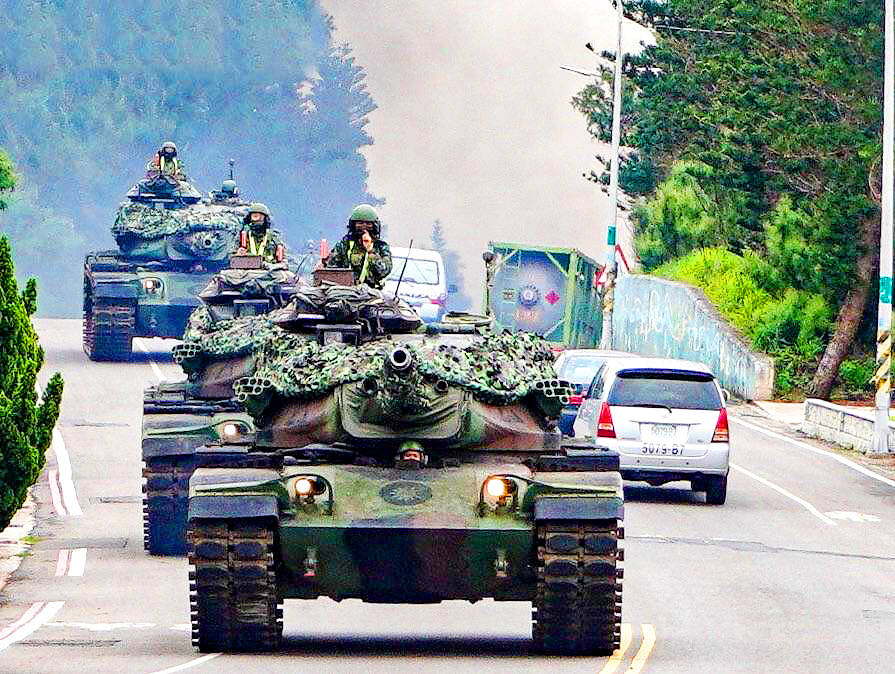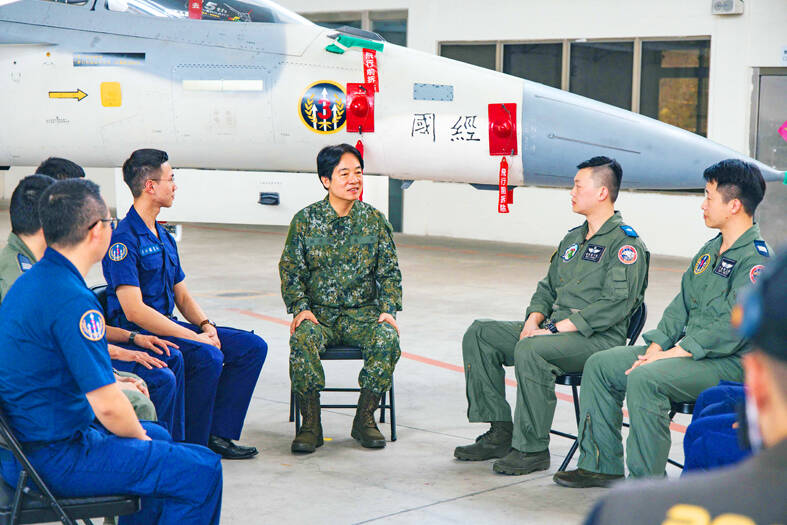The armed forces would for the first time test new rules of engagement (ROE) at this month’s annual Han Kuang exercises, the Ministry of National Defense (MND) said yesterday.
The exercises, which are to run from July 22 to 26, will feature unscripted war games, and a decentralized command and control structure, military officers told a news conference in Taipei.
ROE cards would be issued to select combat troops to test their ability to function without tight control, they said.

Photo: Liu Yu-ching, Taipei Times
The most recent edition of the rules was published last year, they said.
One of the cards’ two templates identifies enemy targets that soldiers can legitimately engage in, such as combat personnel, command structure, facilities, systems and equipment designated as hostile by the armed forces, they said.
The template also designates scenarios wherein lethal force can be used to defend members of friendly armed forces, designated infrastructures, prisoners of war and detainees, and humanitarian aid workers, they said.

Photo: AFP / Ministry of National Defense’s Youth Daily News
The other template provides definitions and guidelines for target discrimination, proportionality, necessity and other principles governing the rules, they said.
It also lists unlawful targets, including civilians and civilian objects, wounded enemy troops who are incapable of resistance, prisoners of war, and medical personnel, facilities and vehicles, they said.
The military would utilize the upcoming practical exercises and the computer simulations in April to assess the efficacy of the ROE cards and mission-specific ROE, Deputy Chief of the General Staff for Operations and Planning Major General Tung Chih-hsing (董冀星) said.
The point of these cards is to “spell out the conditions for employing weapons during combat operations, and specify people and organizations being protected at wartime,” he said.
Asked to clarify content in the cards stipulating acceptable civilian casualties under the proportionality principle, MND Department of Legal Affairs head Major General Yu Chien-chang (余健昌) said that protecting civilians is a universal value.
“The conduct of military operations against the enemy sometimes unavoidably leads to harm to civilians,” he said. “For that reason, the armed forces made the ROE cards to guide troops in assessing potential collateral damage.”
Asked about the cards’ legal status, he said they were written in accordance with domestic and international laws governing the legitimate conduct of warfare.
Combat troops might receive mission-specific ROEs to guide their conduct during a particular operation, he said.
Separately yesterday, President William Lai (賴清德) told air force officers that there are many examples in history of smaller militaries beating larger opponents.
Wearing camouflaged military fatigues and taking questions in front of a Ching-kuo Indigenous Defense Fighter at an air base in Taichung, Lai said that military strength is not a simple mathematical question of addition and subtraction.
“The amount of equipment admittedly is important, but it cannot represent the military power of a country,” Lai said in video footage released by his office. “In history, there are many cases where the few win out over the many, and there are countless ways to win over old-fashioned enemies with new thinking.”
A senior Taiwanese official last month said that this year’s annual Han Kuang exercises would be as close as possible to actual combat, no longer just putting on a show to score points, but aiming to simulate real fighting given a rapidly rising threat from China.
Asked by a fighter pilot whether Taiwan was giving people the wrong impression it was preparing for war with its focus on defense self-sufficiency, Lai said he wanted peace.
“Some people might have such misgivings, but everyone knows we are a peace loving country,” he said. “But the peace we want is a ‘true peace’ that has a solid foundation and is established by our own strength.”
Additional reporting by Reuters

CHAOS: Iranians took to the streets playing celebratory music after reports of Khamenei’s death on Saturday, while mourners also gathered in Tehran yesterday Iranian Supreme Leader Ayatollah Ali Khamenei was killed in a major attack on Iran launched by Israel and the US, throwing the future of the Islamic republic into doubt and raising the risk of regional instability. Iranian state television and the state-run IRNA news agency announced the 86-year-old’s death early yesterday. US President Donald Trump said it gave Iranians their “greatest chance” to “take back” their country. The announcements came after a joint US and Israeli aerial bombardment that targeted Iranian military and governmental sites. Trump said the “heavy and pinpoint bombing” would continue through the week or as long

TRUST: The KMT said it respected the US’ timing and considerations, and hoped it would continue to honor its commitments to helping Taiwan bolster its defenses and deterrence US President Donald Trump is delaying a multibillion-dollar arms sale to Taiwan to ensure his visit to Beijing is successful, a New York Times report said. The weapons sales package has stalled in the US Department of State, the report said, citing US officials it did not identify. The White House has told agencies not to push forward ahead of Trump’s meeting with Chinese President Xi Jinping (習近平), it said. The two last month held a phone call to discuss trade and geopolitical flashpoints ahead of the summit. Xi raised the Taiwan issue and urged the US to handle arms sales to

BIG SPENDERS: Foreign investors bought the most Taiwan equities since 2005, signaling confidence that an AI boom would continue to benefit chipmakers Taiwan Semiconductor Manufacturing Co’s (TSMC, 台積電) market capitalization swelled to US$2 trillion for the first time following a 4.25 percent rally in its American depositary receipts (ADR) overnight, putting the world’s biggest contract chipmaker sixth on the list of the world’s biggest companies by market capitalization, just behind Amazon.com Inc. The site CompaniesMarketcap.com ranked TSMC ahead of Saudi Aramco and Meta Platforms Inc. The Taiwanese company’s ADRs on Tuesday surged to US$385.75 on the New York Stock Exchange, as strong demand for artificial intelligence (AI) applications led to chip supply constraints and boost revenue growth to record-breaking levels. Each TSMC ADR represents

State-run CPC Corp, Taiwan (CPC, 台灣中油) yesterday said that it had confirmed on Saturday night with its liquefied natural gas (LNG) and crude oil suppliers that shipments are proceeding as scheduled and that domestic supplies remain unaffected. The CPC yesterday announced the gasoline and diesel prices will rise by NT$0.2 and NT$0.4 per liter, respectively, starting Monday, citing Middle East tensions and blizzards in the eastern United States. CPC also iterated it has been reducing the proportion of crude oil imports from the Middle East and diversifying its supply sources in the past few years in response to geopolitical risks, expanding